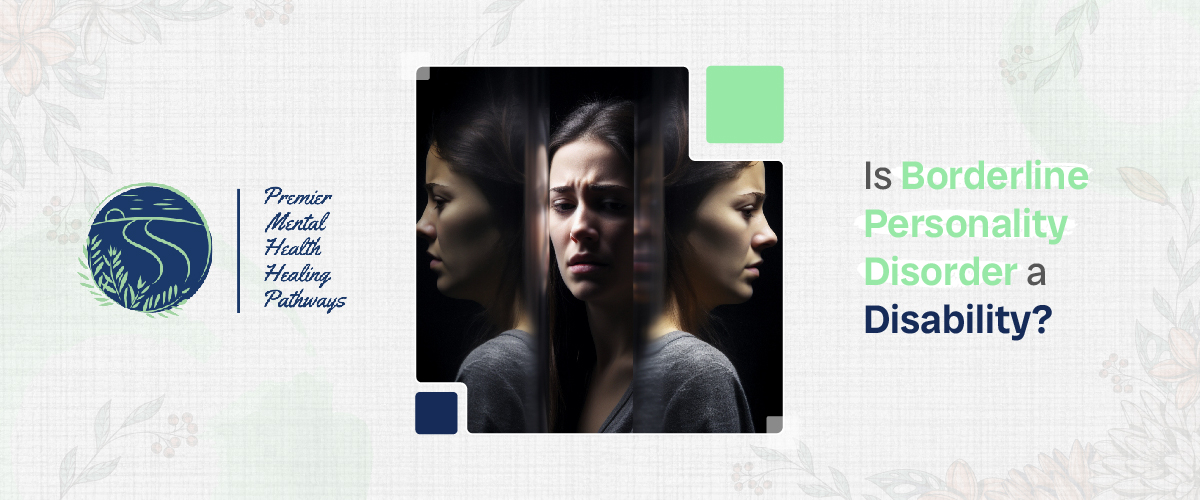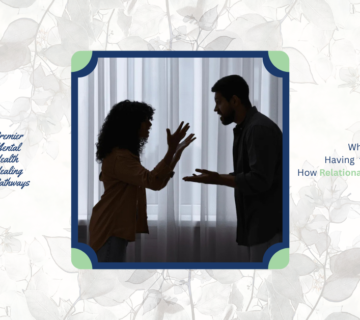Borderline personality disorder (BPD) symptoms can be very different in how bad they are and how they affect people.
Some people may only have mild symptoms, but for others, the condition may be so bad that it makes it impossible for them to do almost anything in their daily lives.
Because BPD has so many different effects, each case is looked at separately to see if it is a disability.
Let’s look into the details: does borderline personality disorder qualify for disability?
If you and your loved ones suffer from BPD and want medical professional help you can go Premier Mental Health Healing Pathways.
You are not alone we can help you!
What Is Borderline Personality Disorder?
Emotionally Unstable Personality Disorder (EUPD), which is another name for borderline personality disorder (BPD), is a group of symptoms that can be very difficult to deal with and make it hard to function. These things can happen to people with BPD:
- Extreme and Quick Mood Swings: Going from one extreme emotion to another quickly and for no apparent reason.
- Impulsive Behaviors: Doing things that are dangerous or hurtful to yourself.
- Self-Harm and Suicidal Thoughts: Having trouble controlling thoughts of hurting oneself or committing suicide.
- Chronic Feelings of Emptiness: Being bored or unhappy all the time.
- Fear of Abandonment: Putting in a lot of effort to avoid real or imagined separation.
- Identity Disturbance: A highly unstable self-image or sense of self.
Many people who have BPD also have other disorders, like depression, anxiety, or substance abuse, that can make their symptoms worse and make it harder for them to go about their daily lives.
What are the Risk Factors for Borderline Personality Disorder?
Studies show that genetic, environmental, and social factors may make it more likely for someone to develop borderline personality disorder. Some of these factors are:
- Family History: Because of shared genetics, people who have a close family member (like a parent or sibling) with the disorder may be more likely to also develop it themselves.
- Brain Structure and Function: Studies have shown that people with borderline personality disorder may have changes in the structure and function of their brains, especially in parts that manage their emotions and urges. It is not clear, though, whether these changes caused the disorder or brought it about.
- Environmental, Cultural, and Social Factors: A lot of people with borderline personality disorder say they went through traumatic events as children, like being abused, abandoned, or having a hard time. Others may have been in relationships or fights that were unstable or invalidating.
Is Borderline Personality Disorder a Disability?

In the US, people with BPD can be considered disabled in some situations. As per the Americans with Disabilities Act (ADA), a disability is a mental or physical impairment that makes it very hard to do one or more important things in life.
Because of this, BPD could be considered a disability if it makes it very hard for someone to go about their daily life.
For bipolar disorder to be considered a disability, it must:
- Substantially Limit Major Life Activities: The condition must have a big effect on daily tasks like working, taking care of oneself, or talking to other people.
- Documented by a Healthcare Provider: For legal recognition and accommodation requests, you need a diagnosis and documentation from a mental health professional.
Can you Get Disability for Borderline Personality Disorder
The Social Security Administration (SSA) has specific rules for mental illnesses, such as borderline personality disorder (BPD).
In order to get disability benefits, you have to show that your BPD is persistent, ongoing, and keeps you from keeping a job.
Once you send in your application, the SSA will make sure you meet the requirements in both sections A and B.
Medical Documentation
You must have medical evidence showing a consistent pattern of at least one of the following:
- Mistrust and Suspiciousness of Others: Constant Feelings of mistrust.
- Detachment from Social Relationships: Pulling away from or avoiding social interactions.
- Disregard for and Violation of the Rights of Others: breaking social rules and other people’s rights all the time.
- Instability of Interpersonal Relationships: Personal relationships that are unstable and intense.
- Excessive Emotionality and Attention Seeking: Strong and dramatic feelings.
- Sense of Inadequacy: Persistent feelings of not being good enough.
- Dependence on Others for Support and Care: An excessive need to be taken care of.
- Perfectionism and Orderliness: An obsessive concentration on control and perfection.
- Recurrent, Impulsive, and Aggressive Behavior Outbursts: Behavior that is impulsive and aggressive that happens a lot.
Functional Limitations
You must have a lot of trouble in at least one of these areas or a lot of trouble in two or more:
- Processing, Recalling, or Utilizing Information: Challenges with mental processes and recall.
- Communicating with Others: Problems in relationships and BPD social anxiety.
- Issues with Focus and Consistency in Tasks: focusing, sticking with an activity, or maintaining a steady work pace.
- Managing or Adapting: Need help keeping up with daily tasks and adjusting to changes.
According to the SSA, an extreme limitation is not being able to function “independently, appropriately, effectively, and on a sustained basis.” It is possible to do some things on your own, but only to a limited or inconsistent extent.
BPD Disability Requirements
If you answer yes to the following questions, you might qualify for disability benefits:
- Are you seeing a psychiatrist? Have you been under their care for several months?
- Have you been in the hospital for BPD? History of stays in hospitals for your condition.
- Are you suspicious of others? Do you constantly feel mistrust?
- Are the relationships in your life unstable? Having trouble keeping relationships stable.
- Do you find it hard to control your feelings or actions? Frequently losing control of your emotions or behaviors.
- Is it hard for you to talk to other people? Challenges with social interactions and communication.
You can make a strong case for disability benefits by ensuring that your symptoms meet these criteria and obtaining detailed medical documentation.
Getting help from a medical professional and a lawyer can also make the application process more manageable.
Conclusion- Is Borderline Personality Disorder a Disability?
Borderline Personality Disorder (BPD) is a disability that makes it very hard to do everyday things in life.
To get disability benefits, you need to show that your symptoms are severe and have been going on for a long time.
Getting help from medical professionals and lawyers can increase your chances of getting approved.
FAQs
Can Borderline Personality Disorder (BPD) qualify as a disability in the United States?
Yes, BPD can be a disability in the U.S. if it makes it very hard to do important things in life.
The Social Security Administration (SSA) has certain requirements that you must meet, such as showing medical proof of severe and long-lasting symptoms that make it impossible for you to work.
What criteria must be met for BPD to be considered a disability by the SSA?
To get disability benefits, you need to show medical proof that your symptoms do not go away.
These symptoms can include mistrust of others, unstable relationships, acting without thinking, and more.
You must also show that you have significant problems with things like self-management, social interaction, processing information, and focusing on tasks.
How do I apply for disability benefits if I have BPD?
To apply for disability benefits, you need to get detailed medical records from a doctor or nurse, such as a diagnosis and proof that you are still getting treatment.
After that, you can send your application to the SSA, making sure that you meet the requirements in both sections A and B.
Q: What support is available for people with BPD seeking disability benefits?
Medical professionals, like psychiatrists and therapists, can help and can provide the necessary paperwork and treatment records.
Talking to a lawyer who specializes in disability claims can also help you through the application process and raise your chances of being approved.





No comment